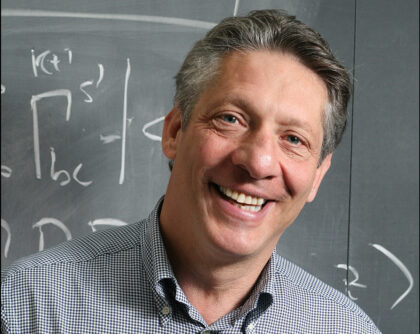Edward Farhi
Research Interests
Edward Farhi was trained as a theoretical particle physicist but has also worked on astrophysics, general relativity, and the foundations of quantum mechanics. His present interest is the theory of quantum computation.
As a graduate student, Farhi invented the jet variable “Thrust,” which is used to describe how particles in high energy accelerator collisions come out in collimated streams. He then worked with Leonard Susskind on grand unified theories with electro-weak dynamical symmetry breaking. He and Larry Abbott proposed an (almost viable) model in which quarks, leptons, and massive gauge bosons are composite. With Robert Jaffe, he worked out many of the properties of a possibly stable super dense form of matter called “Strange Matter” and with Charles Alcock and Angela Olinto he studied the properties of “Strange Stars.” His interest then shifted to general relativity and he and Alan Guth studied the classical and quantum prospects of making a new inflationary universe in the laboratory today. He, Guth and others also studied obstacles to constructing a time machine.
Since the late 1990’s Farhi has been studying how to use quantum mechanics to gain algorithmic speedup in solving problems that are difficult for conventional computers. He and Sam Gutmann proposed the idea of designing algorithms based on continuous time quantum walks. This has been used to demonstrate the power of quantum computation over classical. They, along with Jeffrey Goldstone and Michael Sipser, introduced the Quantum Adiabatic Algorithm which beyond its theoretical interest led to the design of hardware specific for this algorithm. This group was tied for first in showing that there is a problem that cannot be sped up by a quantum computer. In 2007, Farhi, Goldstone and Gutmann showed that a quantum computer can determine who wins a game faster than a classical computer. In 2010, he along with Peter Shor and others at MIT introduced a scheme for Quantum Money which so far has resisted attack. In 2014, Farhi, Goldstone and Gutmann introduced the Quantum Approximate Optimization Algorithm which is an all purpose solver for combinatorial optimization problems. Its power has been explored in over 4000 papers that cite the QAOA. This algorithm may be one of the first uses of a high fidelity error corrected quantum computer.
Edward Farhi continues to work on quantum computing but keeps a close eye on particle physics and recent developments in cosmology.
See also: W. M. Keck Foundation Center for Extreme Quantum Information Theory (xQIT), Quantum Information Science at MIT
Biographical Sketch
Edward (Eddie) Farhi went to the Bronx High School of Science and Brandeis University before getting his Ph.D. from Harvard in 1978. He was then on the staff at the Stanford Linear Accelerator Center and at CERN in Geneva Switzerland before coming to MIT, where he joined the faculty in 1982. At MIT, he taught undergraduate courses in quantum mechanics and special relativity. At the graduate level he taught quantum mechanics, quantum field theory, particle physics and general relativity. Farhi won three teaching awards at MIT and in 2000, 2001, and 2002 he lectured the big freshman physics course, “8.01.” From 2004 until 2016, he served as Director of the MIT Center for Theoretical Physics. Since retiring from the faculty in 2018 he is a full time researcher at Google working on quantum computing. He still spends much time at MIT.
Courtesy of Wondros | YouTube
Awards & Honors
- 2011 // American Physical Society Fellow "For his seminal discoveries of new quantum algorithms and quantum computational paradigms, in particular the quantum walk and quantum adiabatic methods."
- 2004-16 // Director, MIT Center for Theoretical Physics (CTP) (now the MIT Center for Theoretical Physics -- a Leinweber Institute (CTP-LI))
- 1996 // Teaching Prize for Excellence in Graduate Education, MIT School of Science
- 1987 // Buechner Teaching Prize, MIT
- 1985 // Appointed Class of 1956 Career Development Professor
- 1984 // Sloan Research Fellowship
- 1984 // Graduate Student Council Department Teaching Award, MIT
Key Publications
-
SPIRES HEP Literature Database (particle physics)
-
arXiv.org e,Print archive (quantum computing)
